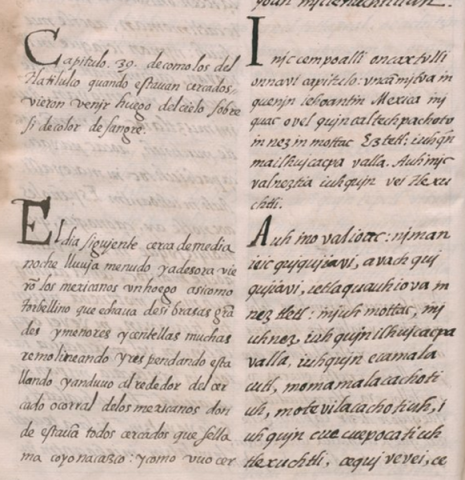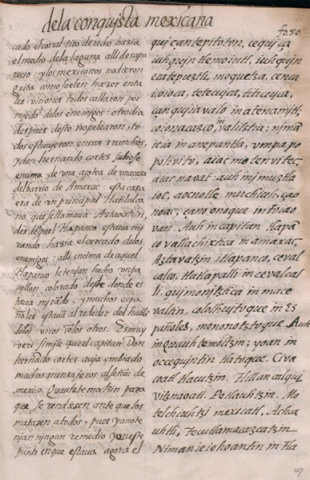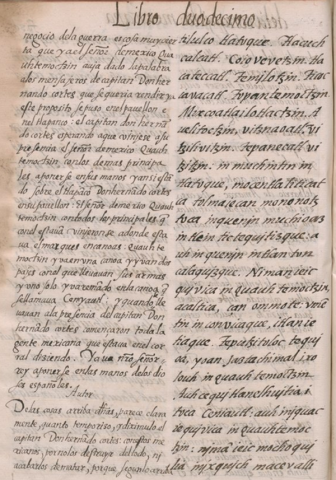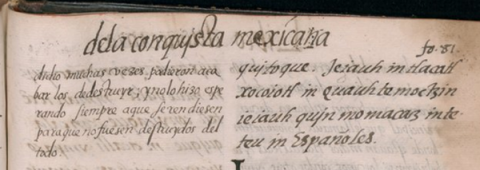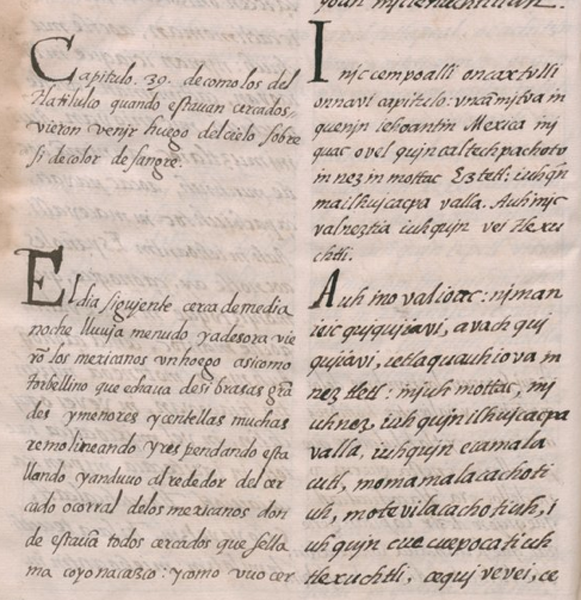 |
[Transcription of the Nahuatl (right-hand column) by James Lockhart:]
[f. 79v., cont.] Inic cempoalli oncaxtolli onnavi capitulo: vncā mitoa in quenin iehoantin Mexica in iquac o vel quincaltechpachoto in nez in mottac Eztetl:* iuhq̄nma ilhuicacpa valla. Auh inic valneztia iuhquin vei tlexuchtli.
Auh in ovalioac: niman ie ic quiquiiavi, avachquiquiiavi, ie tlaquauhiova in nez tletl: in iuh mottac, in iuh nez, iuhquin ilhuicacpa valla, iuhquin ecamalacutl, momamalacachotiuh, motevilacachotiuh, iuhquin cuecuepocatiuh tlexuchtli, cequi vevei, ce
----------
*EZTETL. I take the intention to be "Eztletl." Compare the Spanish version and the Nahuatl text below.
|
[Translation of the Nahuatl (right-hand column) by James Lockhart:]
Thirty-ninth chapter, where it is said how when [the Spaniards] had forced the Mexica to the very wall, there appeared and was seen a blood-colored fire1 which seemed to come from the sky. It appeared like a great blazing coal as it came.
When night came, it rained and sprinkled off and on. It was very dark when a fire appeared. It looked and appeared like it was coming from the sky, like a whirlwind. It went spinning around and around, turning on itself; as it went it seemed to explode into coals, some large, some
[Translation of the Spanish (left-hand column) by James Lockhart:]
Chapter Thirty-nine, of how the Tlatelolca, when they were encircled, saw a blood-colored fire come upon them from the sky.
The next day, about midnight, it was drizzling, and suddenly out of nowhere the Mexica saw a fire, like a whirlwind, throwing off large and small coals, and many sparks whirling, flashing, and exploding. It went around the fence or enclosure of the Mexica, where they were all surrounded at a place called Coyonacazco; when it had
|
[Translation of the Nahuatl into Spanish by Fr. Bernardino de Sahagún; transcription of the Spanish (left-hand column) by James Lockhart:]
[f. 79v., cont.] Capitulo .39. de como los del Tlatilulco quando estauan cercados vieron venir huego del cielo sobre si de color de sangre.
El dia siguiente cerca de medianoche lluuia menudo y a desora vierō los mexicanos vn hoego asi como torbellino que echaua de si brasas grādes y menores y centellas muchas remolineando y respendando* estallando y anduuo alrededor del cercado o corral de los mexicanos donde estauā todos cercados que se llama coyonacazco: y como vuo cer
----------
*RESPENDANDO. Apparently for something on the order of "resplandeciendo."
|
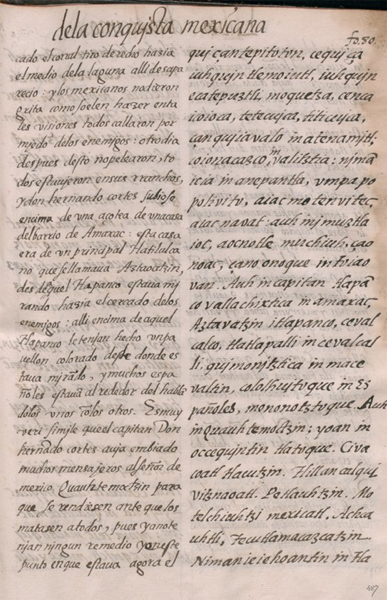 |
[Transcription of the Nahuatl (right-hand column) by James Lockhart:]
[f. 80r.] qui çan tepitoton, cequi ça iuhquin tlemoiutl, iuhquin ecatepuztli,* moquetza, cenca icoioca, tetecuica, titicuica, çan quiiavalo in atenamitl; coionacazco in valitztia: nimā ic ia in anepantla, vmpa popolivito, aiac motenvitec, aiac navat:
auh in imuztlaioc, aoc no tle muchiuh, ça onoac, çano onoque in toiaovan. Auh in capitan tlapāco vallachixtica in amaxac, Aztavatzin itlapanco, cevalcalco, tlatlapalli in cevalcalli, quimonitztica in macevaltin, cololhuitoque in Españoles, mononotztoque.
Auh in Quauhtemoctzin; yoan in oc cequintin tlatoque. Civacoatl Tlacutzin. Tlillancalqui. vitznaoatl. Petlauhtzin. Motelchiuhtzi mexicatl. Achcauhtli, Tecutlamacazcatzin. Niman ie iehoantin in Tla
----------
*ECATEPUZTLI. Scattered attestations of this term in Nahuatl annals, though the give us no exact translation, imply that an ecatepoztli was some sort of meteorological phenomenon.
|
[Translation of the Nahuatl (right-hand column) by James Lockhart:]
small, some just like sparks. It seemed to take on the aspect of a “wind-axe.” It sputtered, crackled, and snapped. It circled the walls at the water, heading toward Coyonacazco, then it went into the midst of the water and disappeared there. No one struck his hand against his mouth, no one uttered a sound.
And the next day, again nothing happened. Everyone just lay still, and so did our enemies. And the Captain was looking down from a rooftop in Amaxac, the roof of Aztahuatzin. From a varicolored canopy he was looking out at the people. The Spaniards crowded about him, consulting with one another.
And Quauhtemoctzin and the other rulers—the Cihuacoatl Tlacotzin, the Tlillancalqui Petlauhtzin, the Huitznahuatl Motelchiuhtzin mexicatl, the Achcauhtli Teuctlamacazqui [chief lordly priest], and then the rulers of Tlatelolco,
[Translation of the Spanish (left-hand column) by James Lockhart:]
circled the enclosure it shot straight toward the middle of the lake and disappeared there. The Mexica did not shout out as they usually do with such visions; they all kept quiet for fear of the enemy.
The day after this they did not fight; they all stayed in their huts. Don Hernando Cortés climbed up on the roof terrace of a house in the district of Amaxac. This house belonged to a Tlatelolca leader called Aztahuatzin. From that tlapanco he looked toward the enclosure of the enemy; there on top of that tlapanco they had set up for him a red canopy from which he looked out, and many Spaniards were around him, speaking with one another.
It is very plausible that Captain don Hernando Cortés had sent many messengers to the lord of Mexico, Quauhtemoctzin, that they should surrender before they were all killed, because they no longer had any remedy. At this point in the
|
[Translation of the Nahuatl into Spanish by Fr. Bernardino de Sahagún; transcription of the Spanish (left-hand column) by James Lockhart:]
[f. 80r.] cado el corral tiro derecho hazia el medio de la laguna alli desaparecio: y los mexicanos no dieron grita como soelen hazer en tales visiones todos callaron por miedo de los enemigos:
otro dia despues desto no pelearon, todos estuuieron en sus rranchos, y don hernando cortes subiose encima de vna açotea de vna casa del barrio de Amaxac; esta casa era de vn principal Tlatilulcano que se llamaua Aztaoatzin, desde aquel Tlapanco estaua mirando hazia el cercado de los enemigos: alli encima de aquel Tlapanco le tenian hecho vn pauellon colorado desde donde estaua mirādo, y muchos españoles estauā alrededor del hablādo los vnos cō los otros.
Es muy verisimile que el capitan Don hernādo cortes auia embiado muchos mensajeros al señor de mexico Quauhtemoctzin para que se rendiesen ante que los matasen a todos, pues ya no tenian ningun remedio y en este punto en que estaua agora el
|
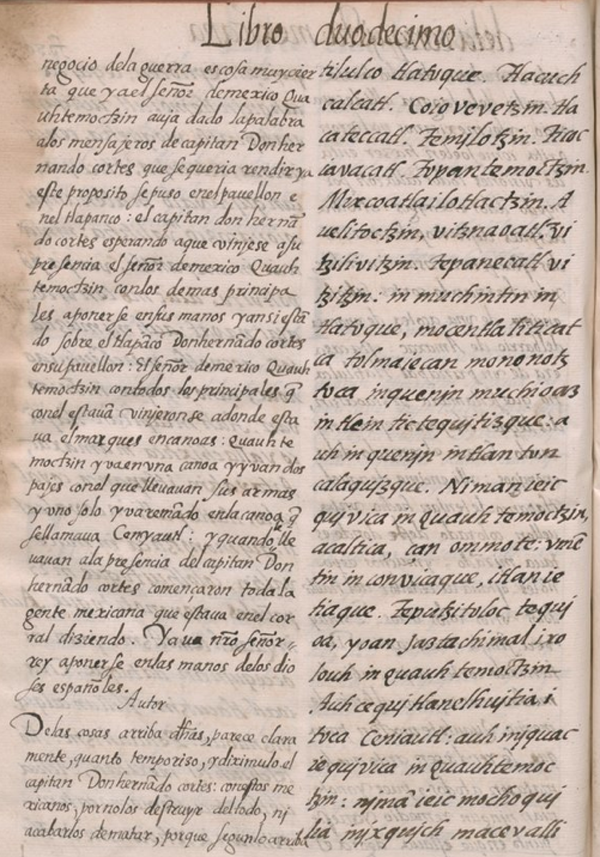 |
[Transcription of the Nahuatl (right-hand column) by James Lockhart:]
[f. 80v.] tilulco tlatoque. Tlacuchcalcatl. Coiovevetzin. Tlacateccatl. Temilotzin. Ticociavacatl. Topantemoctzin. Mixcoatlailotlactzin. Auelitoctzin, vitznaoatl. Vitzilivitzin. Tepanecatl vitzitzin: in muchintin in tlatoque, mocentlaliticatca tolmaiecan mononotztoca in quenin muchioaz in tlein tictequitizque: auh in quenin intlan toncalaquizque.
Niman ie ic quivica in Quauhtemoctzin, acaltica, çan ommote: vmētin in convicaque, itlan ietiaque. Teputzitoloc tequioa, yoan Iaztachimal ixolouh in Quauhtemoctzin. Auh ce quitlanelhuitia itoca Ceniautl: auh in iquac ie quivica in Quauhtemoctzin: nimā ie ic mochoquilia in ixquich macevalli
|
[Translation of the Nahuatl (right-hand column) by James Lockhart:]
the Tlacochcalcatl Coyohuehuetzin, the Tlacateccatl Temilotzin, the Ticocyahuacatl Topantemoctzin, the Mixcoatlailotlac Ahuelitoctzin, the Huitznahuatl Huitzilihuitzin, and the Tepanecatl Huitzitzin—all of the rulers were gathered at Tolmayeccan consulting about what was to be done, what our tribute duty should be, and how we should submit to them.
Then they took Quauhtemoctzin in a boat. In it were only two people accompanying him, going with him: Tepotzitoloc, a seasoned warrior, and Iaztachimal, Quauhtemoctzin’s page, with one person who poled them along, named Cenyaotl. When they were about to take Quauhtemoctzin, all the people wept,
[Translation of the Spanish (left-hand column) by James Lockhart:]
progress of the war, it is very certain that the lord of Mexico, Quauhtemoctzin, had given his word to the messengers of Captain don Hernando Cortés that he wanted to surrender, and it is for that purpose that Captain don Hernando Cortés took up position under the canopy on the tlapanco, waiting for Quauhtemoctzin the lord of Mexico to come into his presence with the other leaders to place himself in his hands.
With don Hernando Cortés thus on the tlapanco under his canopy, the lord of Mexico, Quauhtemoctzin, and all the leaders who were with him came in canoes to where the Marqués was. Quauhtemoctzin went in a canoe; two pages went with him, bearing their arms, and a single one went along paddling the canoe, called Cenyaotl. When they were taking him to see Captain don Hernando Cortés, all the Mexica who were in the enclosure began <to lament>, saying, "Our lord king is going to place himself in the hands of the Spanish gods."
Author:
From the things said above it appears clearly how much Captain don Hernando Cortés temporized and overlooked things with these Mexica in order not to destroy them completely nor kill them all, because according to what was said above
|
[Translation of the Nahuatl into Spanish by Fr. Bernardino de Sahagún; transcription of the Spanish (left-hand column) by James Lockhart:]
[f. 80v.] negocio de la guerra es cosa muy cierta que ya el señor de mexico Quauhtemoctzin auia dado la palabra a los mensajeros de* capitan Don hernando cortes que se queria rendir y a este proposito se puso en el pauellon en el tlapanco: el capitan don hernādo cortes esperando a que viniese a su presencia el señor de mexico Quauhtemoctzin con los demas principales a ponerse en sus manos
y ansi estādo sobre el tlapāco Don hernādo cortes en su pauellon: El señor de mexico Quauhtemoctzin con todos los principales q̄ con el estauā vinieronse adonde estaua el marques en canoas: Quauhtemoctzin yva en vna canoa y yvan dos pajes con el que lleuauan sus armas y vno solo yva remādo en la canoa q̄ se llamaua Cenyautl: y cuando le lleuauan a la presencia del Capitan Don hernādo cortes començaron toda la gente mexicana que estaua en el corral diziendo. Ya ua n̄r̄o señor rey a ponerse en las manos de los dioses españoles.
Autor
De las cosas arriba đħas, parece claramente, quanto temporizo, y diximulo el capitan Don hernādo cortes: con estos mexicanos, por no los destruyr del todo, ni acabarlos de matar, porque segun lo arriba
----------
*DE. For standard "del."
|
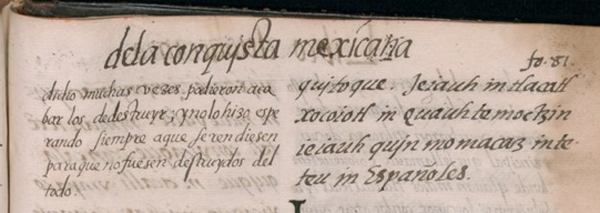 |
[Transcription of the Nahuatl (right-hand column) by James Lockhart:]
[f. 81r.] quitoque. Ie iauh in tlacatl xocoiotl in Quauhtemoctzin ie iauh quinmomacaz in teteu in Españoles.
|
[Translation of the Nahuatl (right-hand column) by James Lockhart:]
saying “There goes the lord Quauhtemoctzin, going to give himself to the gods, the Spaniards.”
[Translation of the Spanish (left-hand column) by James Lockhart:]
they could have finished destroying them many times, but he did not do it, always waiting for them to surrender so that they would not be completely destroyed.
|
[Translation of the Nahuatl into Spanish by Fr. Bernardino de Sahagún; transcription of the Spanish (left-hand column) by James Lockhart:]
[f. 81r.] dicho muchas vezes podieron acabarlos de destruyr: y no lo hizo esperando siempre a que se rendiesen para que no fuesen destruydos del todo:
|
